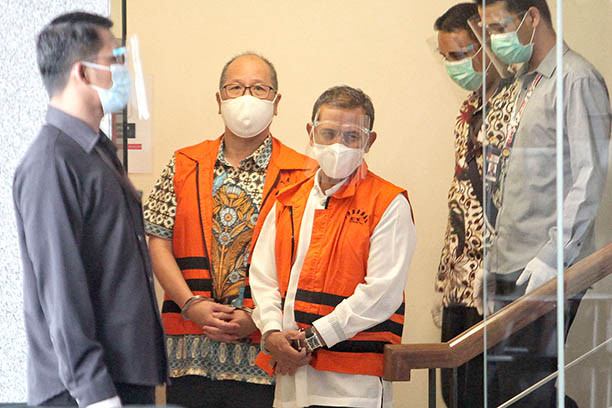A lesson from Cimahi
Not only has the arrest undermined democracy as the most trusted mechanism to elect a leader, it has given a bad name to regional autonomy.
Change Size

L
ess than two weeks until people in 270 regions go to the polls to elect their leaders, the Corruption Eradication Commission (KPK) arrested Cimahi Mayor Ajay Muhammad Supriatna on Monday in a bribery case related to a permit for a hospital expansion project. The graft case serves as yet another grim reminder that the high expectations that motivate voters to elect a leader could end in a betrayal of campaign promises.
Not only has the arrest undermined democracy as the most trusted mechanism to elect a leader, it has given a bad name to regional autonomy, which was renewed more than 20 years ago with the hope to accelerate the delivery of public services. Cimahi will not host an election this time around, but the West Java city has provided a valuable lesson to the people in nine provinces, 37 cities and 224 regencies who will cast their ballots on Dec. 9.
Ajay, a businessman-cum-politician, has extended the list of regional heads, the fruits of post-New Order regional autonomy, who have been entangled in corruption. In fact, Ajay is the third Cimahi mayor in a row the KPK has arrested for bribery. The two previous mayors of Cimahi, Atty Suharti and her husband, Itoc Tochija, were convicted of accepting bribes related to the development of Baru Atas market.
KPK data shows that the antigraft body investigated 25 governors and 274 regents and mayors between 2004 and 2019, which only demonstrates how susceptible regional leaders are to corrupt practices, despite the democratic process of their election.
One of the reasons behind this rampant corruption among local politicians is the high political costs they have to pay, right from the day they declare their intention to run. It has been an open secret that candidates have to pay dearly to secure a ticket from political parties, either before voting day or after they get elected.
A study has put the estimate at between Rp 20 billion (US$1.41 million) for a regental post and Rp 100 billion for a gubernatorial post. Consider a regent who can only earn Rp 5 billion from legitimate sources after completing his or her term, abuse of power will be the easiest way to plug the huge deficit.
The COVID-19 pandemic may have cut spending on mass campaign rallies, but corruption watchdogs have warned that the health crisis will not substantially reduce the political costs. They have expressed their fear that candidates and their campaign teams will instead intensify their vote-buying attempts and take advantage of social-distancing measures.
On the demand side, more voters will need cash now that the pandemic has hit the national economy hard and affected people’s well-being.
The Elections Supervisory Body (Bawaslu), civil society groups and the public at large can help keep the credibility of the upcoming regional elections and their results intact through their close monitoring of candidates and their campaign teams.
The regional elections will cost the nation a whopping Rp 20.5 trillion and that will turn to waste if they produce corrupt regional leaders.









